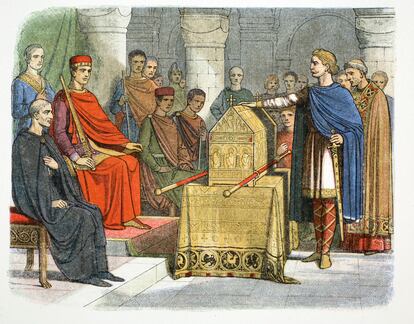"Guerreros, reinos en conflicto y vikingos: Así se forjó Inglaterra en una era de violencia" | Cultura | EL PAÍS English

Entre el ocaso del dominio romano en Gran Bretaña y la conquista normanda de Inglaterra, sucedieron innumerables acontecimientos. Entre ellos, se destacó el surgimiento de Inglaterra misma, un nacimiento tumultuoso en medio de un muro de escudos (la característica formación militar de aquella época bélica), reinos en conflicto entre sí, vikingos, y personajes fascinantes envueltos en la atmósfera de leyendas de tiempos salvajes y sangrientos, de los cuales aún resuena el eco del incesante choque de espadas.
The renowned and media-savvy British medievalist Marc Morris, 51, dedicates his latest book, The Anglo-Saxons: A History of the Beginnings of England (2021), to telling this complex yet fascinating story of “the ethnogenesis of the English.” In the story he narrates, brutal warlords with a Tolkienian flavor pass through with their rings, swords, and helmets. There’s King Rædwald of East Anglia, who was buried on the Sutton Hoo ship, and Penda of Mercia. There are also self-sacrificing religious men and saints, as well as ambitious and corrupt bishops, like Winfrid. There are great kings like Æthelbald of Wessex, Offer of Mercia (who is associated with the defensive wall known as “Offa’s Dyke”), or Alfred the Great. The latter unleashed “Alfredmania” on the field of medieval studies yet Morris points out (with very British humor) that the king suffered from hemorrhoids and that the oldest monument in Wessex dedicated to the monarch is a pub, which was built in 1763.
The book also has Vikings… and lots of them. They turned the Anglo-Saxon world upside down. Had they prevailed (although some would argue that they did, via their Norman relatives), they would have aborted the England we know today. Among these Vikings was Ivar the Boneless — the son of the legendary Ragnar Lodbrok, well known today thanks to the Vikings TV series — and Halfdan, who settled in Northumbria; Guthrum, who was baptized by Alfred himself, alongside his warrior chiefs; Svein Splitbeard and his son, Canute, who became king of England after defeating Edmund Ironside at the Battle of Assandun (1016); or Harald Hardrade — the Thunderbolt of the North — who had to be content with six feet of English soil after being killed in the battle of Stamford Bridge. His warriors lost for having declined to wear chain mail because of the heat.


El contenido negativo en redes sociales afecta más a quienes lidian con problemas de salud mental, advierte un estudio.

"‘Separated’: Lecciones del Pasado y Claves para el Futuro de la Inmigración en EE. UU."

"Surviving the Darién Gap: A Harrowing Journey Through One of the World's Most Dangerous Regions"

Última hora: Cámara de Representantes aprueba ley de financiamiento y la envía al Senado justo antes de la fecha límite para evitar el cierre del gobierno.

"Rupert Rucker (Schroders) afirma: 'Los activos medianos y pequeños de EE UU, olvidados por años, presentan oportunidades atractivas'" | Mercados Financieros | Cinco Días

